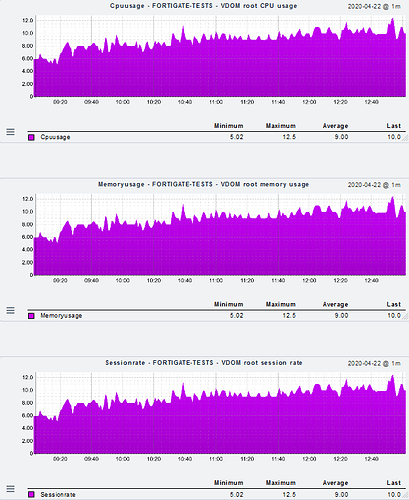Hi
I followed this old guide to create a plugin/agent for monitoring Fortigate Virtual Domains (VDOMs):
def inventory_fortigate_vdom_cpu(info):
for VDOMname, cpuusage in info:
yield VDOMname, cpuusage
fortigate_vdom_cpu_default_levels = (80.0, 90.0)
def check_fortigate_vdom_cpu(item, params, info):
# warn, crit = params
warn = fortigate_vdom_cpu_default_levels[0]
crit = fortigate_vdom_cpu_default_levels[1]
for VDOMname, cpuusage in info:
if VDOMname == item:
cpuusage = float(cpuusage)
perfdata = [ ( "CPUusage", cpuusage, warn, crit ) ]
if cpuusage > crit:
return 2, "CRIT - excessive CPU usage (%s>%s): %s" % (cpuusage,crit,cpuusage), perfdata
elif cpuusage > warn:
return 1, "WARN - CPU usage is worrying (%s>%s): %s" % (cpuusage,warn,cpuusage), perfdata
else:
return 0, "OK - CPU usage is normal: %s" % (cpuusage,), perfdata
check_info["fortigate_vdom.cpu"] = {
"check_function" : check_fortigate_vdom_cpu,
"inventory_function" : inventory_fortigate_vdom_cpu,
"service_description" : "VDOM %s CPU usage",
"has_perfdata" : True,
"snmp_info" : ( ".1.3.6.1.4.1.12356.101.3.2.1.1", [ "2", "5" ] ),
"snmp_scan_function" : lambda oid: oid(".1.3.6.1.4.1.12356.101.3.2.1.1.5.*") != None,
}
.1.3.6.1.4.1.12356.101.3.2.1.1.2.* is a table holding the VDOM names.
.1.3.6.1.4.1.12356.101.3.2.1.1.5.* is a table holding the VDOM CPU usage.
It appeared to run fine… so I created another plugin for Memory Usage:
check_info["fortigate_vdom.memory"] = {
"check_function" : check_fortigate_vdom_mem,
"inventory_function" : inventory_fortigate_vdom_mem,
"service_description" : "VDOM %s memory usage",
"has_perfdata" : True,
"snmp_info" : ( ".1.3.6.1.4.1.12356.101.3.2.1.1", [ "2", "6" ] ),
"snmp_scan_function" : lambda oid: oid(".1.3.6.1.4.1.12356.101.3.2.1.1.6.*") != None,
}
But eventually I realized that the graphics displayed the same values for CPU and Memory and they were wrong – I run a script which launches check_snmp comands and displayed other values.
Where is my mistake?
Best regards.
P.D: Here you can find a snapshot of the graphics of the three services of the same VDOM called root. They look the same graphic, even though their values are very different:
The current values got by check_snmp Nagios plugin are:
SNMP OK - CPUusage 13 | CPUusage=13;80;90
SNMP OK - Memoryusage 13 | Memoryusage=13
SNMP OK - Sessionrate 1963 | Sessionrate=1963
